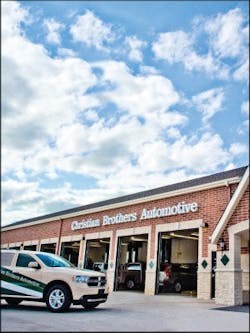Every company is built up of layers, says Josh Wall. Systems, processes, employees, customers, facility characteristics—they are all aspects of the business that, when stacked together, determine a business’s culture and how it’s perceived by its market.
The various layers of a business are Wall’s specialty.
“There are a lot of layers to what we do and how we do it,” says Wall, vice president of franchise and strategic development for Christian Brothers Automotive, “but it’s also who we are.
“All those things have to be put together, and put together in the right way and in a way that’s repeatable, in order to be successful and expand.”
And there’s Christian Brothers’ specialty: successful expansion.
Through religiously following a set of moral, operational and service-oriented systems, the faith-based Houston company has become one of America’s fastest-growing multiple-shop operations.
Nearly 20 years since opening its first franchise location in 1996, Christian Brothers now has 127 shops in 17 states. By the end of 2015, it’ll have 25 more, covering an additional six states.
And if you’re keeping score, Christian Brothers is 127-for-127; It’s never had a store default on a loan.
Then there’s this: It’s done everything without selling out the soul of the company—its foundation of core values that, Wall feels, is the key to its success.
How did Christian Brothers do it? Following a simple rule: Love your neighbor as you would yourself—and finding a way to systemize that.
The Backstory
When Mark Carr founded Christian Brothers in 1982, he did so as an absentee owner. He wasn’t an industry lifer or a former tech looking to branch out on his own. Shop ownership happened almost by chance, through someone he’d met through his church. He was looking to open a shop, and asked Carr, an established businessman, if he’d be interested in being a partner.
Nearly a year later, they opened as Christian Brothers Automotive—as in brothers in Christ, in relation to how the two men met—in Mission Bend, Texas, just outside Houston.
While Carr remained in his previous job, the business stayed stagnant for several years.
“After seven years or so of little growth, he came to the realization of how critical leadership was and how an owner or operator really needed to be involved more,” Wall says.
Carr began to immerse himself in the business and manage the shop, and within the first year, sales grew 35 percent.
“Because he wasn’t coming at it from the perspective someone else might’ve who’d been in the industry their whole career, he simply operated the way he felt a shop should from his perspective as a customer,” Wall says. “How did he want to be treated in a shop? That’s what he focused on, and customers really responded.”
The Problem
For the next decade, Carr focused on streamlining his operation and putting in processes and systems that would help meet the company’s overarching goal of providing a premier customer experience.
The shop was clean, organized and had the highest-level tooling and equipment. He focused on hiring the correct front office employees, ones with service-minded personalities, not necessarily industry veterans. He put an emphasis on continued training and education with his staff, wanting each technician to earn Master certification through ASE.
All of these decisions paid off, as the roughly 5,000-square-foot Mission Bend facility became a $1 million shop.
It wasn’t until 1996 that Carr began considering expansion.
He’d built what he felt was a special business with a unique culture for the industry at that time. Could he repeat that in a new facility? In five new facilities? In 100?
He wanted to find out.
The Solution
There are countless examples in other industries. For proof, just walk into any Starbucks; it doesn’t matter if you’re in Boston, Chicago or Los Angeles, you’ll get a nearly identical experience.
The companies that scale most successfully are ones that do it without losing their culture, without losing the overall mission that differentiates them from competitors.
But how do they do it?
Wall says it’s all about breaking down those layers. You start with the desired result—in Christian Brothers’ case, the proper customer experience—and you start peeling back layers, step by step, to find your starting point. Then you rebuild using those layers.
For Christian Brothers that means a focus on three key areas: the company’s people, the right customers, and the shop itself to carry it all out in.
BUILDING A TEAM PART 1: The Owner. As Carr learned in his first shop, everything starts with the owner. In his opinion, he didn’t see any way to start and build up a new business without a true leader in place. This is why Christian Brothers went with a franchise model, rather than corporate-owned facilities, Wall says. By positioning each store with its own franchisee/owner, each store then has a significant stake in the game.
And the company’s stringent approval and training process for franchisees ensures they have the correct person at each business.
“We want people who believe in the same core things as we do as a company,” Wall says. “We want family-oriented people who truly want to help serve their communities.”
The experience requirements include past history in building and leading teams—no matter the industry—and already being a visible part of the community.
The company’s training process takes care of the rest. It normally takes up to two years between finding a location and franchisee to opening the doors of the shop. In between, that franchisee gets engrossed in training. They are educated, off and on, for the first year and a half about the industry, their markets and the standard operating procedures Christian Brothers established. Then, two months before opening, they go to the company’s Houston headquarters for active training. They spend time in another franchisee’s shop (one the company certifies for training), learning day-to-day operations, and have that trainer in-shop for the first week the new facility is open. They then receive one-on-one coaching from an on-staff business coach at headquarters, which includes weekly calls and two yearly visits.
BUILDING A TEAM PART 2: The Staff. The people are the most important part of any business, Wall says, and Christian Brothers is very specific with hiring technicians.
“We want experienced technicians who value continued education and value being a true professional tech, and not a mechanic,” Wall says.
They want Master-level techs to fill out all positions, and in order to get the best in the area, Christian Brothers has a recruiting system based on “offering the things that these types of workers want,” Wall says.
A family-friendly schedule is one offering; no Christian Brothers shop is open on weekends (more on scheduling later). The high-tech equipment and budget for keeping tools updated is another. The company also offers education opportunities, both in regard to ASE certifications and beyond. Currently, the company is developing a new continuing education and in-house certification program called Christian Brothers AutoU, which will launch in 2015.
BUILDING A CUSTOMER BASE: Often, when you get a customer in your store for the first time, you have just one chance to win them over. That’s why the customer experience is so critical, Wall says. It’s also why you need to be attracting customers that value that experience.
Christian Brothers is very careful about choosing the right markets it enters. Generally, Wall says, they want an area highly populated with middle- to upper-middle-class consumers. They need vehicles that are out of warranty—between 5 and 11 years old.
“We don’t have the same budgets some national chains do to do an all-out media blitz when we move into an area,” Wall says. “So we target all of our efforts on our demographics of customers.”
The company relies on traditional mailings and word-of-mouth advertising; it’s also where the franchisees' connections in the community can play a large role.
“It’s all focused on encouraging that one customer to come in, winning them as a customer and, hopefully, they refer us,” Wall says. “That’s the goal.”
BUILDING THE SHOP: Stick to what’s in your box—that’s the key, Wall says. Carr used the original shop to develop his “box” for franchise locations. Every shop mirrors it in size, layout, look, systems and processes. The general concept: If you’ve established success doing it one way, repeat it; don’t allow variables—like various layouts, size limitations, etc.—add unnecessary risk.
Each facility is a ground-up build. They never move into another shop’s former facility, and will never operate out of a strip mall for appearance, reputation and brand-recognition reasons.
“You need to control and maintain the look and feel of your brand,” Wall says. “You can’t have perceptions about a site, a former business, or a nearby business affect that.”
Each facility is rectangular in shape, roughly 5,000 square feet, and has nine service bays equipped with eight two-post hydraulic lifts and one four-post alignment machine. Each shop uses a customized version of RO Writer as its management system and is open 6 a.m. to 7 p.m. Monday through Friday. (Note: For the first six weeks a new shop opens, it will have Saturday hours (8 a.m. to noon) to “recruit” weekend customers. It’s always advertised as temporary.)
At opening, staff includes one on-site franchisee/owner, one service manager, one service writer and three technicians. As the shop grows to its capacity, it usually has four techs and two service writers.
And, of course, each shop is trained and equipped with the company’s tested SOPs, detailing everything from answering the phone and dispatching work to performing inspections and calling back customers.
The Takeaway
The shop’s successful growth is proof in itself; the brand did more than $150 million in sales in 2013, serving more than 400,000 customers (revenue was calculated based on average shop sales). But, Wall says, the real proof is walking into a facility: Each one is virtually the same in terms of experience, level of service and appearance.
The company has no goals in mind as far as the desired scope of the brand—200 shops? 500? It’s anyone's guess, Wall says.
“The biggest thing is making sure that each shop you open has the optimum chance for success, and that success includes carrying out our mission to serve,” he says. “That’s why we focus on these layers of the business, on this box we created. You stick to the box, and it’s predictable and repeatable and we can control the outcomes much better. When you expand that box, you invite in risk. Expansion is about eliminating risk.”




